Neglecting oral hygiene can have far-reaching effects on general health and quality of life. Here are some reasons why oral health is essential for overall well-being:
Systemic Health Connection
Numerous studies have shown a strong link between oral health and systemic health conditions. Poor oral health has been associated with an increased risk of heart disease, diabetes, respiratory infections, and adverse pregnancy outcomes. This connection emphasizes the importance of maintaining optimal oral health to safeguard overall health.
Digestion and Nutrition
Healthy teeth and gums are essential for proper chewing and digestion. Teeth help break down food into smaller particles, facilitating digestion and nutrient absorption. Gum health is crucial for keeping teeth in place, enabling efficient chewing and preventing difficulties in eating a well-balanced diet.
Confidence and Self-esteem
Oral health significantly impacts our self-image, confidence, and social interactions. Dental issues like tooth loss, bad breath, or discolored teeth can affect our self-esteem and cause social anxiety. Conversely, good oral health promotes a confident smile, enhancing self-esteem and overall well-being.
Pain and Discomfort
Oral health problems, such as tooth decay, gum disease, or oral infections, can cause significant pain and discomfort. This discomfort can affect sleep, eating habits, and overall quality of life. Maintaining good oral health helps prevent such problems and ensures a pain-free mouth.
Prevention of Dental Problems
Practicing good oral hygiene and seeking regular dental care is essential for preventing dental problems. Regular brushing, flossing, and dental check-ups enable early detection of any oral health issues. Early intervention not only prevents complications but also reduces the financial burden associated with extensive dental treatments.
Embrace the Balance: Achieving Holistic Harmony in Your Oral Care Routine
A holistic approach to oral health recognizes the interconnectedness between oral health and overall well-being, focusing on the integration of physical, mental, and emotional aspects of health. It emphasizes that oral health is not isolated but rather influenced by various factors and can, in turn, impact other areas of the body. Here are key aspects of a holistic approach to oral health:
Mind-Body Connection
The mind-body connection plays a crucial role in oral health. Stress, anxiety, and emotional well-being can contribute to oral health issues such as teeth grinding, jaw clenching, and poor oral hygiene habits. Conversely, oral health problems can also affect mental and emotional health, leading to decreased self-confidence and social well-being. Addressing mental and emotional factors through relaxation techniques, mindfulness practices, and stress management can positively impact oral health.
Nutrition and Lifestyle
A holistic approach emphasizes the importance of nutrition and lifestyle choices in maintaining oral health. A balanced diet rich in essential nutrients, vitamins, and minerals supports healthy teeth and gums. Avoiding excessive sugar, acidic foods, and tobacco products can help prevent tooth decay, gum disease, and other oral health problems. Additionally, incorporating regular exercise, adequate sleep, and maintaining a healthy weight can contribute to overall oral health.
Preventive Care
Preventive care is a cornerstone of holistic oral health. It includes regular dental check-ups, professional cleanings, and early intervention to address any dental issues promptly. Preventive measures such as fluoride treatments, dental sealants, and oral hygiene education are essential in maintaining optimal oral health and preventing future problems.
Natural and Alternative Approaches
Holistic dentistry embraces natural and alternative approaches to oral health care. It may involve using biocompatible dental materials, considering the potential impact of dental treatments on the body, and exploring alternative therapies like herbal remedies or acupuncture for managing dental issues. This approach considers individual preferences, beliefs, and overall health goals.
Collaborative Care
A holistic approach encourages collaborative care between oral health professionals and other healthcare providers. Recognizing the interconnectedness of the body, a team-based approach ensures that oral health is considered in the context of overall health. Collaboration between dentists, physicians, nutritionists, and other healthcare providers allows for a comprehensive and integrative approach to oral healthcare.
Self-Care Practices for Optimal Oral Health
Taking care of your oral health goes beyond regular dental check-ups and professional cleanings. It involves incorporating daily self-care practices that promote optimal oral hygiene and overall well-being. Here are some self-care practices you can adopt for maintaining healthy teeth and gums:
Brushing
Brush your teeth at least twice a day with fluoride toothpaste. Use a soft-bristled toothbrush and gentle, circular motions to clean all surfaces of your teeth. Don’t forget to brush your tongue to remove bacteria and freshen your breath.
Flossing
Flossing is essential for removing plaque and food particles from between your teeth and along the gumline. Incorporate daily flossing into your oral hygiene routine to prevent cavities and gum disease. Choose a flossing method that works best for you, whether it’s traditional floss, floss picks, or water flossers.
Mouthwash
Using an antimicrobial mouthwash can complement your brushing and flossing routine by reducing bacteria and freshening your breath. Look for mouthwash that contains fluoride to strengthen your tooth enamel and prevent tooth decay.
Healthy Diet
Nutrition plays a significant role in maintaining good oral health. Eat a balanced diet that includes plenty of fruits, vegetables, lean proteins, and whole grains. Limit your consumption of sugary and acidic foods and beverages, as they can contribute to tooth decay. Drink plenty of water to stay hydrated and promote saliva production, which helps protect your teeth against bacteria.
Limit Tobacco and Alcohol
Tobacco use and excessive alcohol consumption can significantly impact your oral health. Both increase the risk of gum disease, tooth decay, oral cancer, and other oral health problems. Quitting smoking and minimizing alcohol intake can greatly improve your oral and overall health.
Stress Management
Chronic stress can have negative effects on your oral health, such as teeth grinding (bruxism) and temporomandibular joint (TMJ) disorders. Practice stress management techniques like meditation, deep breathing exercises, or engaging in activities you enjoy reducing stress and protecting your oral health.
Regular Dental Check-ups
Even with diligent self-care, it’s important to visit your dentist regularly for check-ups and professional cleanings. Your dentist can identify any early signs of dental issues, provide professional cleanings to remove plaque and tartar, and offer personalized recommendations for maintaining your oral health.
Unlock the Secrets of Professional Dental Care
When it comes to maintaining oral health, seeking professional dental care is vital to caring for your whole self. Regular visits to your dentist go beyond just checking your teeth and gums – they contribute to your overall well-being. Here’s why seeking professional dental care is essential:
Comprehensive Evaluation
A professional dental examination thoroughly evaluates your oral health. Your dentist will assess not only your teeth and gums but also your jaw joints, bite alignment, and soft tissues. This comprehensive evaluation allows them to identify any existing dental issues and potential concerns that may impact your overall health.
Preventive Measures
Professional dental care focuses on preventive measures to avoid dental problems before they arise. Regular dental cleanings remove plaque, tartar, and stains that cannot be effectively eliminated through regular brushing and flossing alone. Additionally, your dentist can provide fluoride treatments and dental sealants to strengthen and protect your teeth against decay.
Early Detection of Dental Issues
Dental problems, such as cavities, gum disease, and oral infections, may not always present noticeable symptoms in their early stages. Regular dental check-ups enable your dentist to identify these issues early on when they are easier to treat. Early detection and intervention can prevent the progression of dental problems and potentially save you from more extensive and costly treatments in the future.
Personalized Treatment Plans
Everyone has unique dental needs. Your dentist can create personalized treatment plans based on your specific oral health requirements. Whether it’s addressing dental issues, restoring missing teeth, or enhancing your smile’s aesthetics, professional dental care ensures that you receive tailored treatments that align with your goals and preferences.
Oral-Systemic Connection
Research has established a strong link between oral health and overall health. Dental problems, such as gum disease, have been associated with various systemic conditions like heart disease, diabetes, and respiratory infections. By seeking professional dental care, you not only address oral health concerns but also contribute to your overall health and well-being.
Expert Advice and Education
Your dentist serves as a valuable source of oral health knowledge and guidance. They can provide you with practical advice on maintaining good oral hygiene, offer tips for managing specific dental issues, and educate you about the impact of lifestyle choices on your oral health. By staying informed, you can make informed decisions about your dental care and improve your overall oral health.
Collaborative Care
Seeking professional dental care allows you to establish a collaborative relationship with your dentist. They work alongside you to achieve and maintain optimal oral health. Your dentist can coordinate with other healthcare professionals, such as medical doctors or orthodontists, to provide comprehensive care that considers your whole self.



